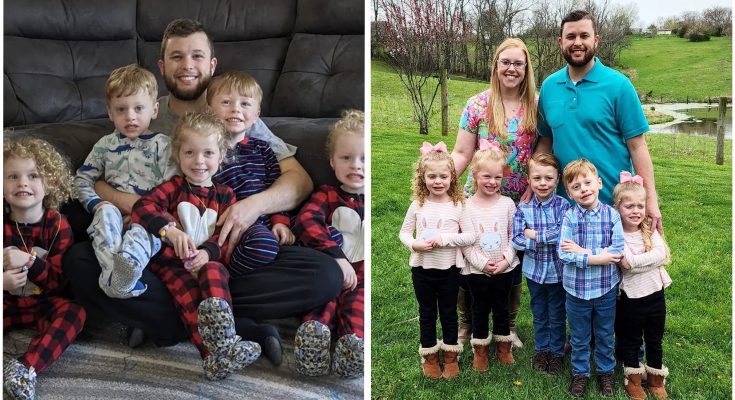Parenting in the public eye is never easy, especially when it’s intertwined with social media. For content creators, every choice they make can quickly become the subject of intense public scrutiny, often sparking heated discussions. This was the case for social media personality Jordan Driskell, a father who found himself at the center of a parenting debate after posting a video that went viral for an unconventional reason: it showed him walking his five-year-old quintuplets on leashes.
Being a parent to five children, let alone quintuplets, presents unique challenges, and Driskell’s decision to use child harnesses stirred mixed reactions from the online community. His original post, titled “Come Walk a Mile in My Shoes,” attracted massive attention, amassing over 3 million views and thousands of comments. While Driskell thanked viewers for the engagement, calling it his most popular video ever, the responses he received reflected the divisive nature of his parenting method.
In the video, Driskell can be seen leading his quintuplets on child harnesses, a parenting choice many users found controversial. Some of the more critical comments drew unflattering comparisons, likening the children to pets. “Are they rescues?” asked one commenter sarcastically, while another bluntly stated, “Those kids are way too old to be walked on a leash.” Such remarks highlight how easily parenting choices can be judged, especially in the hypercritical environment of social media.
Others questioned whether there were alternative ways to handle multiple children without resorting to leashes. One commenter suggested, “Can’t you just train your children well?” This remark underscores the expectation that parents should always have full control over their children, even in situations that demand extraordinary measures.
However, not everyone was critical of Driskell’s approach. Some users expressed understanding, recognizing the complexities of managing five energetic children. “With five kids, you need that,” one user wrote, calling it an example of responsible parenting. Another shared their own experience, saying, “Considering my two-year-old tried to bolt into the street, yeah, we use leashes too now.” These supportive voices reflect how parents of young children often face similar dilemmas and must prioritize safety over public opinion.
One commenter, addressing the backlash directly, urged others to empathize: “For the people complaining about the leashes, you try keeping track of five little kids. They seem perfectly happy.” This response highlights the importance of looking beyond appearances and recognizing that every family navigates its own unique challenges.
In a follow-up interview, Driskell explained his reasoning behind the use of harnesses. He described his children as naturally curious, always eager to explore their surroundings. “Kids are so curious—they want to run off and explore. For our own peace of mind and sanity, we use a leash,” he shared. Driskell emphasized that the harnesses allow his family to enjoy outings together without the stress of constantly worrying about a child wandering off.
He further noted that traditional strollers were impractical for their family, given their size and bulk. The children, he explained, prefer to walk, and the harnesses enable them to do so safely. This setup provides a compromise between the children’s desire for independence and the parents’ need to keep them safe.
The use of child leashes is not a new topic, but it remains a point of contention among parents and child experts. While some pediatricians discourage the use of leashes, citing concerns about promoting autonomy and proper behavior management, others argue that such devices can be helpful in certain situations. The lack of conclusive research on the subject leaves the decision up to individual families, who must weigh the pros and cons based on their own circumstances.
Criticism often stems from the perception that using leashes is demeaning or suggests a lack of parental control. However, those who support the practice view it as a practical solution to real-life challenges, particularly for parents of multiple children or those with kids prone to sudden dashes into dangerous situations. The debate underscores a broader theme: there is no one-size-fits-all approach to parenting.
Jordan Driskell’s story serves as a reminder of how difficult it can be to parent in the public eye. Platforms like TikTok offer a space for parents to share their experiences, but they also expose them to unsolicited opinions from strangers. While some viewers may genuinely offer support or advice, others are quick to criticize without fully understanding the context.
The pressure on parents to meet societal expectations can be overwhelming, especially when their decisions are dissected online. In a world where every parenting choice can become a viral debate, it is crucial to remember that no one has all the answers. What works for one family may not work for another, and each parent must find their own way through trial and error.
At its core, parenting is a deeply personal journey filled with difficult choices, compromises, and moments of joy. For Driskell and his wife, using harnesses for their quintuplets is not about conforming to public opinion but about finding a way to keep their family safe and happy. Their story serves as a reminder that unconventional methods are sometimes necessary to meet the needs of individual families.
As the debate over child leashes continues, it is important to approach these discussions with empathy and understanding. Every parent faces unique challenges, and rather than rushing to judge, the internet community could benefit from offering support or simply letting parents find their own solutions.
In the end, the most important thing is not how others perceive these parenting choices but whether they work for the family involved. Driskell’s experience reminds us that raising children is a journey filled with unexpected challenges, and parents deserve the freedom to navigate that journey in the way that works best for them.



